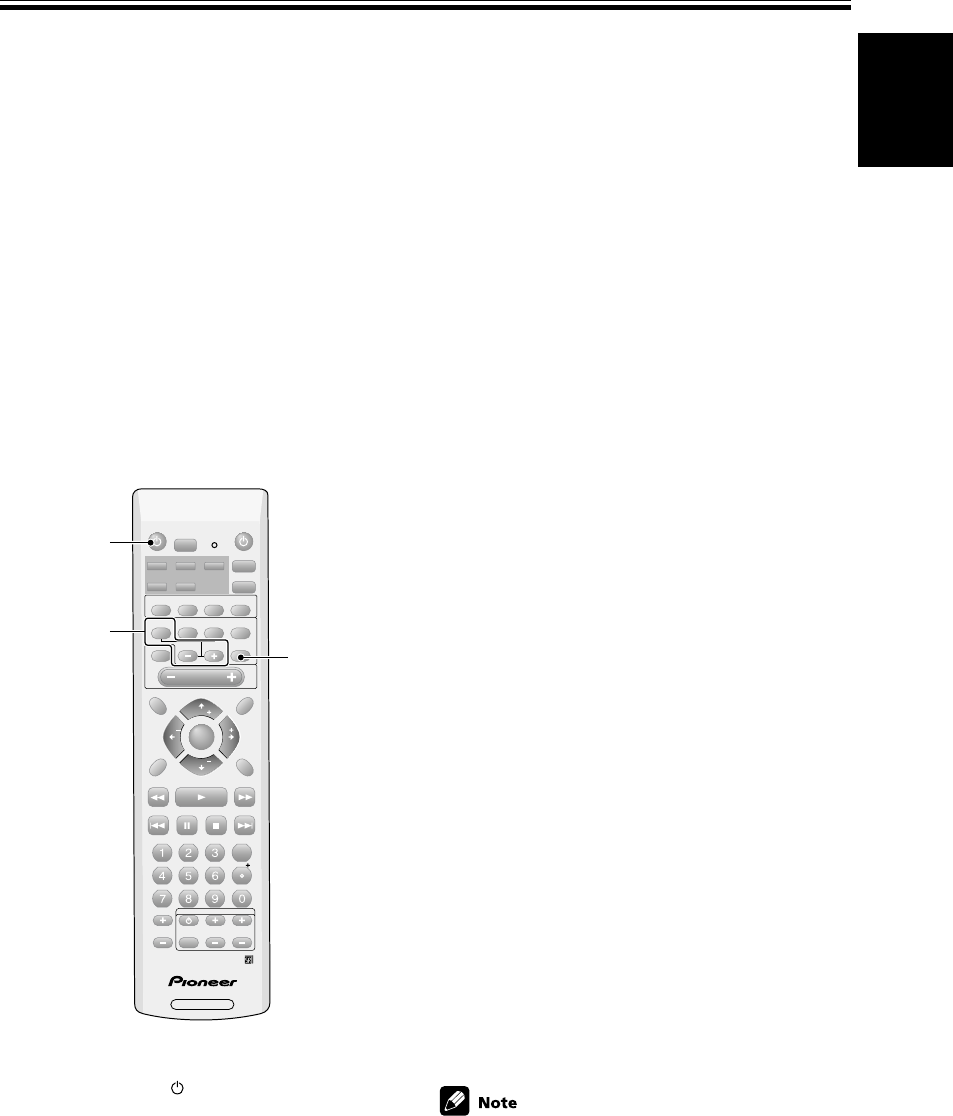
English
29
En
Personalizing Your Surround
Sound
This receiver will make the necessary speakers settings
automatically so you can use it to get enjoyable sur-
round sound without doing anything, but making more
exact settings here will give you finer surround sound.
For better surround sound complete the instructions
that follow the speaker settings. Use the first two steps
on this page and continue on page 30. In this way you
can get maximum performance out of the receiver.
You only need to do these settings once (unless you
change the placement of your current speaker system or
add new speakers, etc.). The following pages offer a
more detailed description of the settings available for
each mode. The default setting is also shown on each
page.
Fine Tuning Your Surround Sound
1
3
2
For best results, start with Front speakers setting
mode and make your initial adjustments in the order
described below.
The current settings are displayed automatically.
• Front speakers setting mode (page 30)
Use to specify the size and configuration of the
FRONT speakers you have connected.
• Center speaker setting mode (page 30)
Use to specify the size and configuration of the
CENTER speaker you have connected.
• Surround speaker setting mode (page 30)
Use to specify the size and configuration of the
SURROUND speakers you have connected.
•
Subwoofer setting mode (page
30)
Use to set the subwoofer output and determine at
which frequency the bass tones will be sent to the
subwoofer (if it is on).
• LFE (Low Frequency Effects) attenuator setting
mode (page 31)
Use to lower the level for the LFE channel (a special
bass channel) when the LFE level is so high as to
distort.
• Front speakers distance setting mode (page 31)
Use to specify the distance from your listening
position to your front speaker.
• Center speakers distance setting mode (page 31)
Use to specify the distance from your listening
position to your center speaker.
• Surround speakers distance setting mode (page
32)
Use to specify the distance from your listening
position to your surround speakers.
• Dynamic range control setting mode (page 32)
Use to compress the dynamic range of a Dolby Digital
soundtrack with this feature (for non-Dolby Digital
soundtracks use the MIDNIGHT mode for the same
effect).
• Dual mono setting (page 32)
Use with soundtracks that have dual mono encoding
if you want to isolate one channel to a particular
speaker.
• Input attenuator setting (page 33)
Use to reduce the analog input level coming into the
receiver when it is so loud as to make it distort.
• Coaxial connection setting (page 33)
Use to tell the receiver (assign) which component is
hooked up the other coaxial digital terminal.
3 Press ENTER to exit the setting mode.
The setting mode is automatically exited if no operation
is performed within 20 seconds.
1 Press RECEIVER to turn the power on.
2 Press SETUP.
Make the adjustments that match your home
setup using the +/– buttons. When finished
with one setting continue to cycle through
the setting modes using the SETUP button
and make adjustments in the same way.
SOURCE
RECEIVER
SLEEP
AUTO
SURROUND
SIGNAL SELECT
ADVANCED
SOUND
MODE
DIMMER
SETUP
DTV ON /OFF
CLASS MPX
TV CONTROL
D.ACCESS
DTV INFOCH RETURN
ENTER
TEST TONE
TOP MENU
DTV MENU
MENU
AUDIO
SUBTITLE
CHANNEL CHANNEL VOLUME
INPUT
SELECT
10
GUIDE
T.EDIT
DISPLAY
CH_SELECT
ROOM
SETUP
RECEIVER
MUTE
ST
TUNE
MASTER
VOLUME
ST
TUNE
DVD
ENTER
ENTER
DVR/ VCR
TV/SAT
FM/AM
FRONT


















